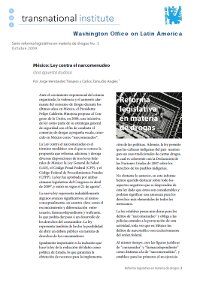Prohibition, a backwards step
The personal dose in Colombia
January 2010
 In December 2009, the Congress in Colombia passed a reform to the 1991 Constitution, which considered the possession and consumption of certain quantities of drugs for personal use legal, to enact constitutional prohibition. This briefing shows the changes that this constitutional amendment entails and evaluates the principle potential consequences.
In December 2009, the Congress in Colombia passed a reform to the 1991 Constitution, which considered the possession and consumption of certain quantities of drugs for personal use legal, to enact constitutional prohibition. This briefing shows the changes that this constitutional amendment entails and evaluates the principle potential consequences.
![]() Download the briefing (211 KB)
Download the briefing (211 KB)
In Colombia there has recently been a change to the personal dose issue, one that could be seen as a major and challenging regression. We are talking about a reform to the 1991 Constitution, passed by the Congress on December 9, 2009 and according to which the possession and consumption of a personal dose of controlled substances is prohibited. With this reform we have gone from a situation in which the law considered the possession and consumption of certain quantities of drugs for personal use legal, thanks to a decision taken by the 1994 Constitutional Court, to their constitutional prohibition.
The above should be considered within the context where many countries around the world have chosen to make the repression of possession and consumption more flexible, following the acknowledgement of the failure of the drugs policies that have come to dominate the international scene. Thus for example, in Europe, Portugal depenalized the possession of any kind of controlled substance for personal use. In the Netherlands consumption is not penalized and the sale of cannabis is allowed in certain establishments. Argentina recently depenalized drug possession for personal use through a court decision. Countries such as Uruguay and Chile do not impose sanctions if the personal dose is consumed in private.
The purpose of this report is to show the changes that this amendment entails and to carry out an evaluation of the principle potential consequences, at least at the legal level.
Recommendations
- The prohibition of consumption and possession passed by the Congress in December 2009 represents a step backwards in the way in which problems that arise from the consumption of controlled substances are dealt with. Increased repression of consumption of these substances does not ensure its reduction and gives rise to serious social and legal consequences.
- In the interest of protecting the health of the population, the country must therefore be in a position to ensure this protection by creating and broadening the health infrastructure needed to be able to deal properly with cases of problematic consumption. The right to health and access to treatment would produce positive results concerning drug consumption in Colombia.
- We must prevent prohibition producing the side effect of an increase in the prison population due to cases of possession and consumption. This would worsen the conditions of overcrowding which plague some of the country’s major prison centres.
- To be able to distinguish between non problematic drug and psychoactive substances consumption, recreational use and problematic use, would weaken the fundamentalist view point which imposes prohibition as it does not take these distinctions into account.
- The fact that prohibition does not allow for the imposition of penalties should be taken advantage of, to offer the problematic user the right to treatment when they request it.
- In order for the recent prohibition not to mean a step backwards for democracy, the Colombian State should take the prevention policies seriously and strengthen the bodies that favour rehabilitation. A policy of harm reduction would be able to achieve better results than repression as an answer to drug consumption.







